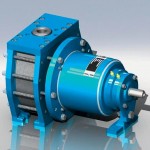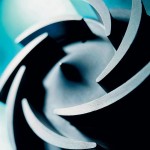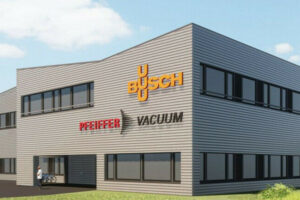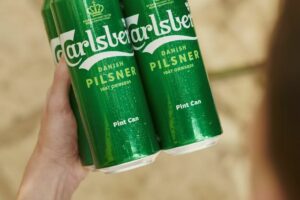Centrifugal and axial pumps made of impregnated graphite represent an attractive technical and economical alternative to fluoroplastic massive or lined pumps with respect to both their reliability in service and their long life under extreme operating conditions. Impregnated graphite pumps withstand even the most corrosive or abrasive media at operating temperatures up to 200 °C.
The author: Claus Friedrich Product Manager Pumps, SGL Group
Any pump operator in the chemical industry will at some time come up against the application limits of plastic pumps (PP, PEHD, PVDF, PTFE, PFA). The durability of both solid and lined plastic pumps declines with each increase in temperature, pressure, corrosiveness, the ability to diffuse or the erosiveness of the transferred fluid. Considering the very high expansion rate of plastics as well as their permeability and thermoplastic behaviour, there is little scope for using them in the design of rotating equipment. As a result, the reliability of plastic pumps is impaired and their service life shortened, as is apparent from the numerous fail-ures occurring in chemical plants. Even PTFE or PFA-lined pumps have inferior mechanical characteristics and permeability when the temperature of the transferred fluid exceeds 140 °C.
In order to overcome these issues, the chemical process equipment division of the SGL Carbon Group has developed a material that defies the combined effect of corrosion and high temperature. This composite material, named Diabon, is manufactured from graphitised carbon and phenolic resin. In fact, its corrosion resistance is unlimited even in the most corrosive media. Diabon graphite is resistant to the vast majority of acids, including hydrochloric acid in any concentration, chlorinated compounds, sulphuric acid, phosphoric acid and pickling baths. Even when used in these highly aggressive media, it easily withstands temperatures up to 200 °C. Diabon is fully impervious to gas and liquids; its permeability is almost zero. Thanks to its carbon matrix, the composite material has a very low coefficient of thermal expansion. This guarantees ideal characteristics for the manufacture of rotating equipment, in which gaps need to be as small as possible in order to ensure a high and constant level of hydraulic performance while simultaneously lim-iting internal recirculation between the impeller and the spiral. Volutes of up to 1.5 m and large impellers up to 550 mm in diameter – designed for the manufacture of high-capacity centrifugal pumps and axial pumps up to 3000 m3/h – are machined from large, homogeneous, monolithic graphite rods. Pump casings with an optional carbon fibre reinforcement applied by the filament winding method are available for high-pressure applications from 16 bar to 25 bar. This optimised design enables the material to withstand extreme mechanical stresses such as pressure surges.
For corrosive media with a high solids content, the SGL Carbon Group has developed Durabon, a special composite material based on amorphous carbon. Sandblasting tests conducted in the laboratory have shown that this new material features a hardness level similar to that of ceramics but with a lower fragility. Pumps manufactured from it have outstanding abrasion resistance even in the most corrosive media. The SGL Carbon Group supplies a range of vortex pumps with free passages of up to 50 mm and capacities of up to 150 m3/h for these special applications.
Different pump models
The pumps in this range comply with the ISO 2858 and ISO 5199 standards and Atex requirements in every respect. They feature capacities up to 450 m3/h and discharge heads up to 130 m. A range of helico-centrifugal pumps has been developed for higher capacities up to 2000 m3/h and discharge heads from 15 to 35 m. Last but not least, the SGL Carbon Group makes circulators or axial pumps with capacities from 500 to 3000 m3/h and discharge heads up to 12 m for recirculating large amounts of corrosive fluids, as required in acid evaporation or regeneration units.
The pumps are offered with single or double mechanical seals. All parts in contact with the process fluid are manufactured from corrosion-resistant materials. Reliable and efficient carbon or silicon carbide seals are available. Maintenance costs have been cut by reducing the diameter of certain seals and by fitting identical seals on both the process and the atmospheric sides.
Reliability in service has been a top priority in the development of magnetic drive pumps. Technical measures have been taken to avoid the risk of process fluid leaking out. For example, the samarium cobalt magnets inside an inner rotor made from Diabon graphite are completely encapsulated to protect them against corrosion. Moreover, a fully vacuum proof, industrial ceramic can is used to prevent the formation of eddy current. The magnetic-drive pump range is designed for capacities up to 100 m3/h and discharge heads up to 60 m.
Broad field of applications
The application fields for Diabon pumps vary widely. They are particularly suitable for corrosive applications. With more than 10,000 units installed all over the world, these pumps have proven their effectiveness and reliability for many years in processes involving hydrochloric acid (synthesis units, evaporation units, ferric or ferrous chloride units, pickling baths), sulphuric acid (dilution units, evaporation units, pickling baths) or food-grade phosphoric acid.
The SGL Carbon Group’s team, comprised of material and hydraulic engineers and technicians, is available to develop and implement special designs that meet the detailed specifications for all non-standard applications in terms of corrosion resistance, thermal stability and hydraulic performance. Customised designs can be realised in just a few weeks using the SolidWorks software.
Online-Info: www.cpp-net.com/2211419
Share:








